Garage Door Monitor and Opener
Dependencies: X_NUCLEO_COMMON ST_INTERFACES
Introduction
This system implements a simple garage door opener and environmental monitor. The hardware connects to the internet using Wi-Fi then on to the Pelion Device Management Platform which provides device monitoring and secure firmware updates over the air (FOTA). Pelion Device Management provides a flexible set of REST APIs which we will use to communicate to a web application running on an EC-2 instance in AWS. The web application will serve a web page where we can monitor and control our garage..
This project is intended to work on the DISCO-L475VG-IOT01A from ST Microelectronics It implements a simple actuator to drive a relay to simulate pushing the "open" button on older style garage doors which do not use a rolling code interface.
The system is designed to be mounted over the door so that the on board time of flight sensor can be used to detect if the door is open or closed.
The system also monitors temperature, humidity and barometric pressure.
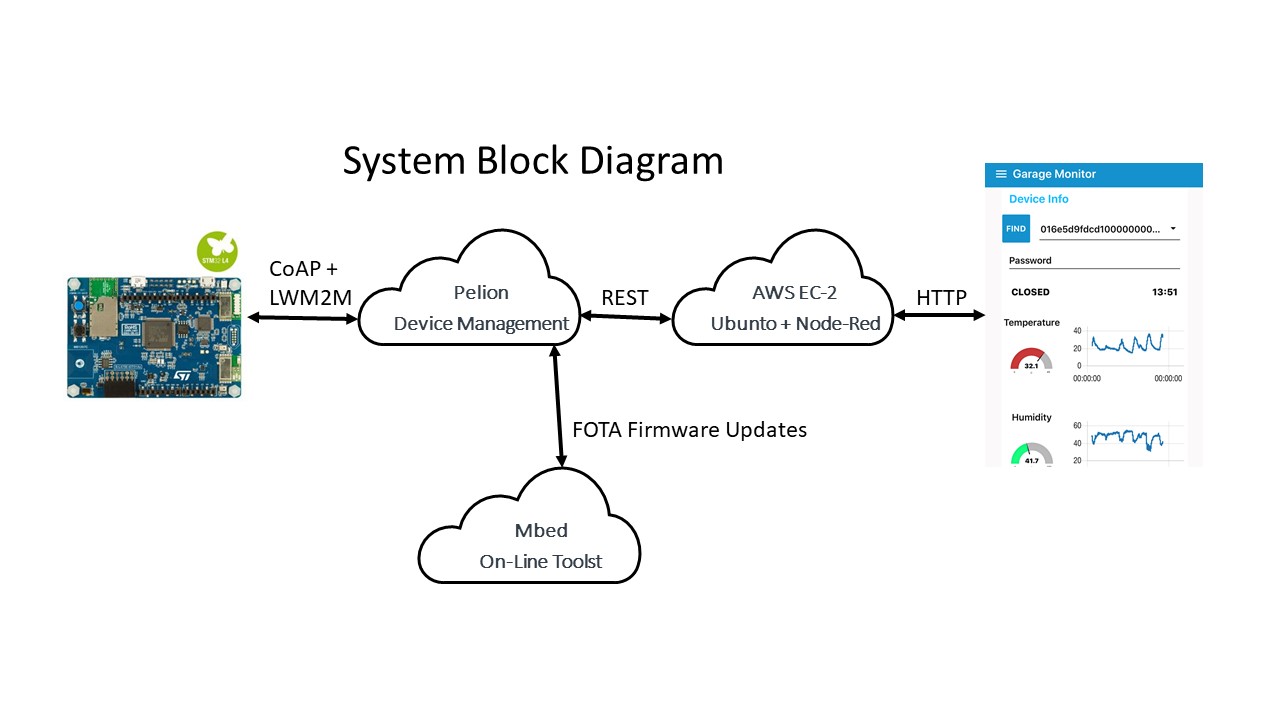
Hardware Requirements:
DISCO-L475G-IOT01A https://os.mbed.com/platforms/ST-Discovery-L475E-IOT01A/
Seeed Studio Grove Relay module https://www.seeedstudio.com/Grove-Relay.html
Seeed Studio Grove cable, I used this one: https://www.seeedstudio.com/Grove-4-pin-Male-Jumper-to-Grove-4-pin-Conversion-Cable-5-PCs-per-Pack.html
Connect to the PMOD connector like this:
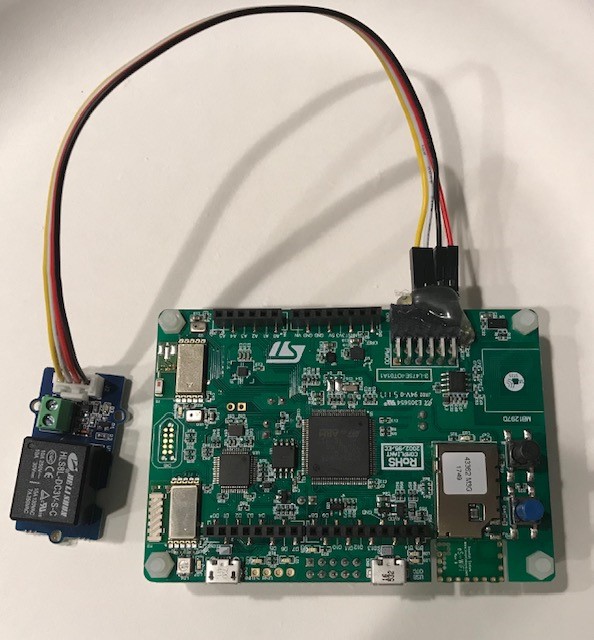
This shows how I installed so that the time of flight sensor can detect when the door is open
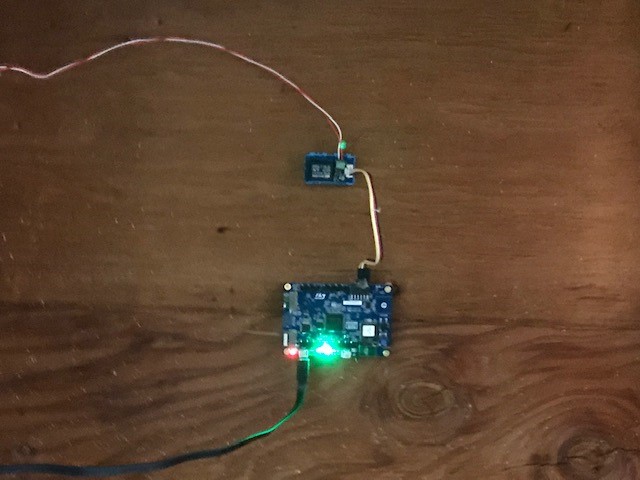
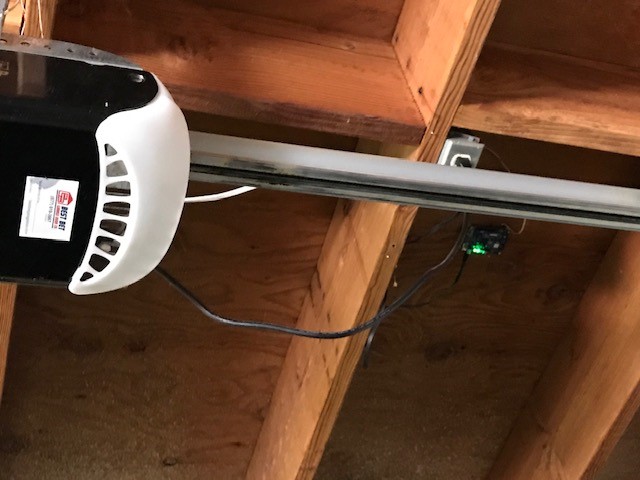
To use the project:
You will also need a Pelion developers account.
I suggest you first use the Pelion quick state to become familiar with Pelion Device Management. https://os.mbed.com/guides/connect-device-to-pelion/1/?board=ST-Discovery-L475E-IOT01A
Web Interface
For my web interface I am running node-red under Ubuntu in an EC2 instance on AWS. This can run for 12 month within the constraints of their free tier. Here is a tutorial: https://nodered.org/docs/getting-started/aws
You will also need to install several node-red add ons:
sudo npm install -g node-red-dashboard
sudo npm install -g node-red-contrib-mbed-cloud
sudo npm istall -g node-red-contrib-moment
After starting node-red import the contents of GarageFlow.txt from the project, pin the flow into the page.
To enable your web app to access your Pelion account you need an API key.
First you will neet to use your Pelion account to create an API key.
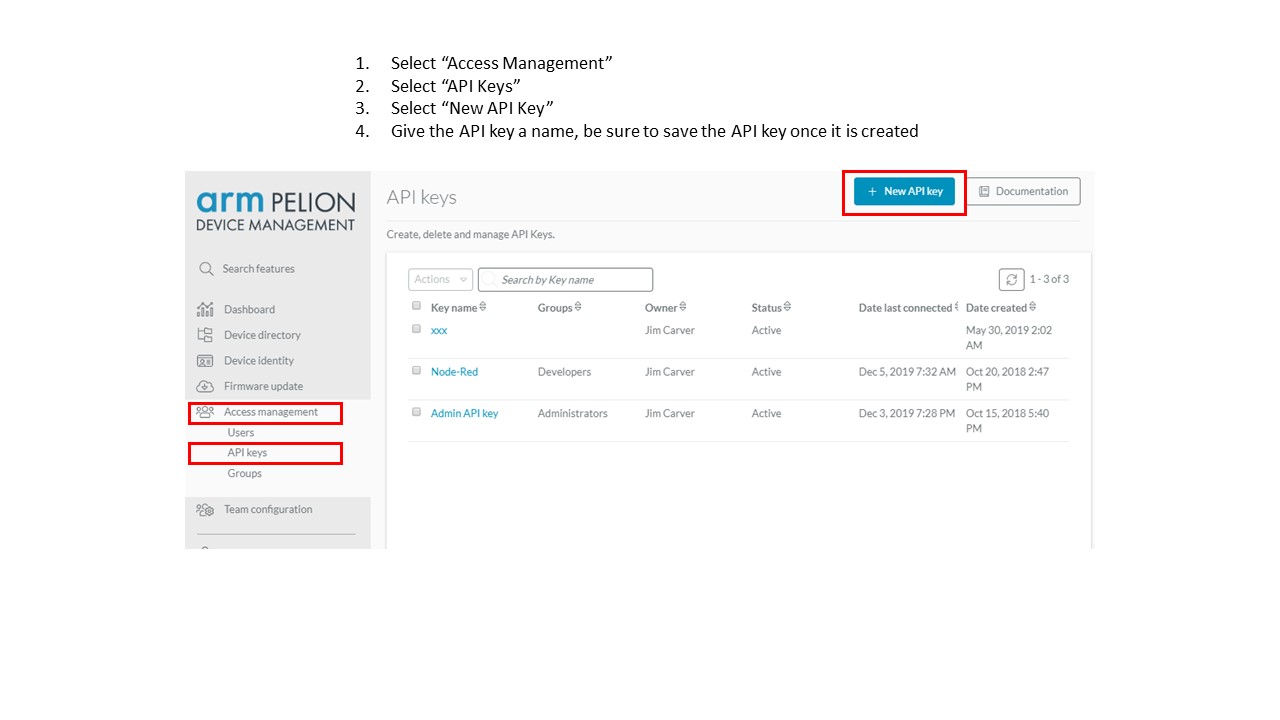
Now we need to apply that API key to your Node-Red flow.
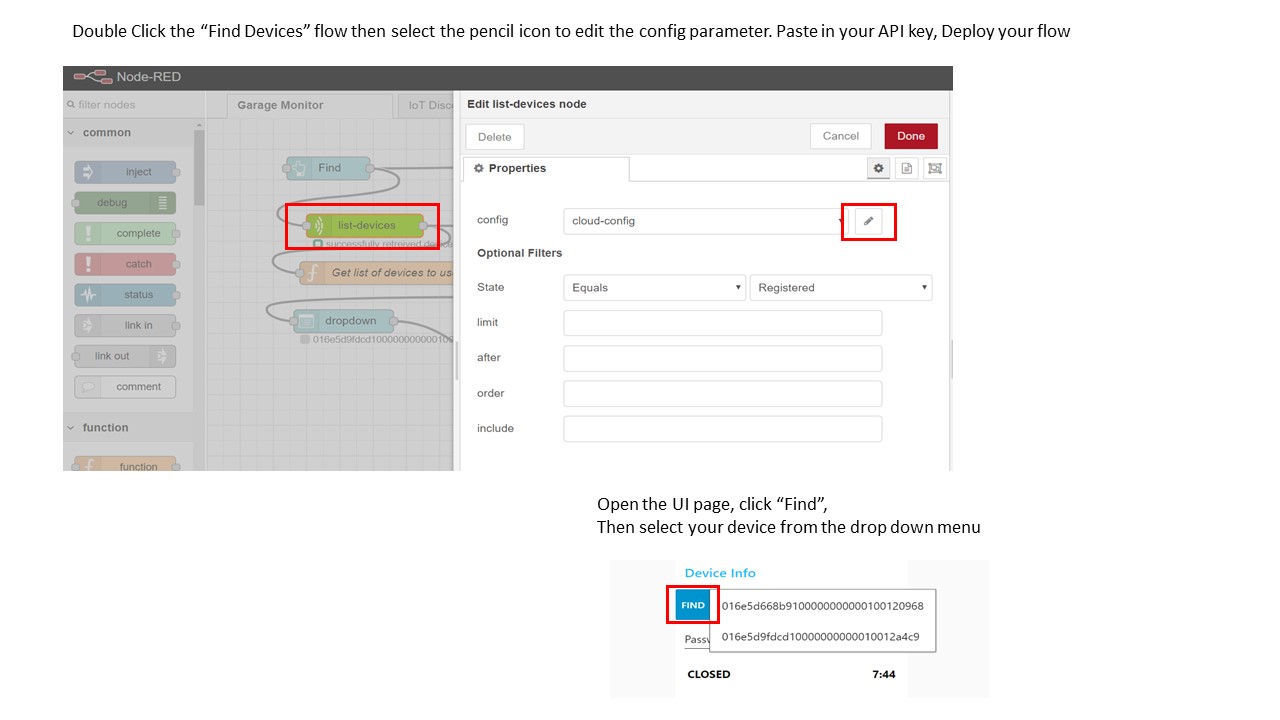
targets/TARGET_STM32L475xG_SRAM2/device/stm32l4xx.h
- Committer:
- screamer
- Date:
- 2019-03-04
- Revision:
- 28:0e774865873d
File content as of revision 28:0e774865873d:
/**
******************************************************************************
* @file stm32l4xx.h
* @author MCD Application Team
* @brief CMSIS STM32L4xx Device Peripheral Access Layer Header File.
*
* The file is the unique include file that the application programmer
* is using in the C source code, usually in main.c. This file contains:
* - Configuration section that allows to select:
* - The STM32L4xx device used in the target application
* - To use or not the peripherals drivers in application code(i.e.
* code will be based on direct access to peripherals registers
* rather than drivers API), this option is controlled by
* "#define USE_HAL_DRIVER"
*
******************************************************************************
* @attention
*
* <h2><center>© COPYRIGHT(c) 2017 STMicroelectronics</center></h2>
*
* Redistribution and use in source and binary forms, with or without modification,
* are permitted provided that the following conditions are met:
* 1. Redistributions of source code must retain the above copyright notice,
* this list of conditions and the following disclaimer.
* 2. Redistributions in binary form must reproduce the above copyright notice,
* this list of conditions and the following disclaimer in the documentation
* and/or other materials provided with the distribution.
* 3. Neither the name of STMicroelectronics nor the names of its contributors
* may be used to endorse or promote products derived from this software
* without specific prior written permission.
*
* THIS SOFTWARE IS PROVIDED BY THE COPYRIGHT HOLDERS AND CONTRIBUTORS "AS IS"
* AND ANY EXPRESS OR IMPLIED WARRANTIES, INCLUDING, BUT NOT LIMITED TO, THE
* IMPLIED WARRANTIES OF MERCHANTABILITY AND FITNESS FOR A PARTICULAR PURPOSE ARE
* DISCLAIMED. IN NO EVENT SHALL THE COPYRIGHT HOLDER OR CONTRIBUTORS BE LIABLE
* FOR ANY DIRECT, INDIRECT, INCIDENTAL, SPECIAL, EXEMPLARY, OR CONSEQUENTIAL
* DAMAGES (INCLUDING, BUT NOT LIMITED TO, PROCUREMENT OF SUBSTITUTE GOODS OR
* SERVICES; LOSS OF USE, DATA, OR PROFITS; OR BUSINESS INTERRUPTION) HOWEVER
* CAUSED AND ON ANY THEORY OF LIABILITY, WHETHER IN CONTRACT, STRICT LIABILITY,
* OR TORT (INCLUDING NEGLIGENCE OR OTHERWISE) ARISING IN ANY WAY OUT OF THE USE
* OF THIS SOFTWARE, EVEN IF ADVISED OF THE POSSIBILITY OF SUCH DAMAGE.
*
******************************************************************************
*/
/** @addtogroup CMSIS
* @{
*/
/** @addtogroup stm32l4xx
* @{
*/
#ifndef __STM32L4xx_H
#define __STM32L4xx_H
#ifdef __cplusplus
extern "C" {
#endif /* __cplusplus */
/** @addtogroup Library_configuration_section
* @{
*/
/**
* @brief STM32 Family
*/
#if !defined (STM32L4)
#define STM32L4
#endif /* STM32L4 */
/* Uncomment the line below according to the target STM32L4 device used in your
application
*/
#if !defined (STM32L431xx) && !defined (STM32L432xx) && !defined (STM32L433xx) && !defined (STM32L442xx) && !defined (STM32L443xx) && \
!defined (STM32L451xx) && !defined (STM32L452xx) && !defined (STM32L462xx) && \
!defined (STM32L471xx) && !defined (STM32L475xx) && !defined (STM32L476xx) && !defined (STM32L485xx) && !defined (STM32L486xx) && \
!defined (STM32L496xx) && !defined (STM32L4A6xx) && \
!defined (STM32L4R5xx) && !defined (STM32L4R7xx) && !defined (STM32L4R9xx) && !defined (STM32L4S5xx) && !defined (STM32L4S7xx) && !defined (STM32L4S9xx)
/* #define STM32L431xx */ /*!< STM32L431xx Devices */
/* #define STM32L432xx */ /*!< STM32L432xx Devices */
/* #define STM32L433xx */ /*!< STM32L433xx Devices */
/* #define STM32L442xx */ /*!< STM32L442xx Devices */
/* #define STM32L443xx */ /*!< STM32L443xx Devices */
/* #define STM32L451xx */ /*!< STM32L451xx Devices */
/* #define STM32L452xx */ /*!< STM32L452xx Devices */
/* #define STM32L462xx */ /*!< STM32L462xx Devices */
/* #define STM32L471xx */ /*!< STM32L471xx Devices */
#define STM32L475xx /*!< STM32L475xx Devices */
/* #define STM32L476xx */ /*!< STM32L476xx Devices */
/* #define STM32L485xx */ /*!< STM32L485xx Devices */
/* #define STM32L486xx */ /*!< STM32L486xx Devices */
/* #define STM32L496xx */ /*!< STM32L496xx Devices */
/* #define STM32L4A6xx */ /*!< STM32L4A6xx Devices */
/* #define STM32L4R5xx */ /*!< STM32L4R5xx Devices */
/* #define STM32L4R7xx */ /*!< STM32L4R7xx Devices */
/* #define STM32L4R9xx */ /*!< STM32L4R9xx Devices */
/* #define STM32L4S5xx */ /*!< STM32L4S5xx Devices */
/* #define STM32L4S7xx */ /*!< STM32L4S7xx Devices */
/* #define STM32L4S9xx */ /*!< STM32L4S9xx Devices */
#endif
/* Tip: To avoid modifying this file each time you need to switch between these
devices, you can define the device in your toolchain compiler preprocessor.
*/
#if !defined (USE_HAL_DRIVER)
/**
* @brief Comment the line below if you will not use the peripherals drivers.
In this case, these drivers will not be included and the application code will
be based on direct access to peripherals registers
*/
#define USE_HAL_DRIVER
#endif /* USE_HAL_DRIVER */
/**
* @brief CMSIS Device version number
*/
#define __STM32L4_CMSIS_VERSION_MAIN (0x01) /*!< [31:24] main version */
#define __STM32L4_CMSIS_VERSION_SUB1 (0x04) /*!< [23:16] sub1 version */
#define __STM32L4_CMSIS_VERSION_SUB2 (0x02) /*!< [15:8] sub2 version */
#define __STM32L4_CMSIS_VERSION_RC (0x00) /*!< [7:0] release candidate */
#define __STM32L4_CMSIS_VERSION ((__STM32L4_CMSIS_VERSION_MAIN << 24)\
|(__STM32L4_CMSIS_VERSION_SUB1 << 16)\
|(__STM32L4_CMSIS_VERSION_SUB2 << 8 )\
|(__STM32L4_CMSIS_VERSION_RC))
/**
* @}
*/
/** @addtogroup Device_Included
* @{
*/
#if defined(STM32L431xx)
#include "stm32l431xx.h"
#elif defined(STM32L432xx)
#include "stm32l432xx.h"
#elif defined(STM32L433xx)
#include "stm32l433xx.h"
#elif defined(STM32L442xx)
#include "stm32l442xx.h"
#elif defined(STM32L443xx)
#include "stm32l443xx.h"
#elif defined(STM32L451xx)
#include "stm32l451xx.h"
#elif defined(STM32L452xx)
#include "stm32l452xx.h"
#elif defined(STM32L462xx)
#include "stm32l462xx.h"
#elif defined(STM32L471xx)
#include "stm32l471xx.h"
#elif defined(STM32L475xx)
#include "stm32l475xx.h"
#elif defined(STM32L476xx)
#include "stm32l476xx.h"
#elif defined(STM32L485xx)
#include "stm32l485xx.h"
#elif defined(STM32L486xx)
#include "stm32l486xx.h"
#elif defined(STM32L496xx)
#include "stm32l496xx.h"
#elif defined(STM32L4A6xx)
#include "stm32l4a6xx.h"
#elif defined(STM32L4R5xx)
#include "stm32l4r5xx.h"
#elif defined(STM32L4R7xx)
#include "stm32l4r7xx.h"
#elif defined(STM32L4R9xx)
#include "stm32l4r9xx.h"
#elif defined(STM32L4S5xx)
#include "stm32l4s5xx.h"
#elif defined(STM32L4S7xx)
#include "stm32l4s7xx.h"
#elif defined(STM32L4S9xx)
#include "stm32l4s9xx.h"
#else
#error "Please select first the target STM32L4xx device used in your application (in stm32l4xx.h file)"
#endif
/**
* @}
*/
/** @addtogroup Exported_types
* @{
*/
typedef enum
{
RESET = 0,
SET = !RESET
} FlagStatus, ITStatus;
typedef enum
{
DISABLE = 0,
ENABLE = !DISABLE
} FunctionalState;
#define IS_FUNCTIONAL_STATE(STATE) (((STATE) == DISABLE) || ((STATE) == ENABLE))
typedef enum
{
ERROR = 0,
SUCCESS = !ERROR
} ErrorStatus;
/**
* @}
*/
/** @addtogroup Exported_macros
* @{
*/
#define SET_BIT(REG, BIT) ((REG) |= (BIT))
#define CLEAR_BIT(REG, BIT) ((REG) &= ~(BIT))
#define READ_BIT(REG, BIT) ((REG) & (BIT))
#define CLEAR_REG(REG) ((REG) = (0x0))
#define WRITE_REG(REG, VAL) ((REG) = (VAL))
#define READ_REG(REG) ((REG))
#define MODIFY_REG(REG, CLEARMASK, SETMASK) WRITE_REG((REG), (((READ_REG(REG)) & (~(CLEARMASK))) | (SETMASK)))
#define POSITION_VAL(VAL) (__CLZ(__RBIT(VAL)))
/**
* @}
*/
#if defined (USE_HAL_DRIVER)
#include "stm32l4xx_hal.h"
#endif /* USE_HAL_DRIVER */
#ifdef __cplusplus
}
#endif /* __cplusplus */
#endif /* __STM32L4xx_H */
/**
* @}
*/
/**
* @}
*/
/************************ (C) COPYRIGHT STMicroelectronics *****END OF FILE****/